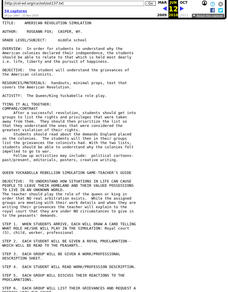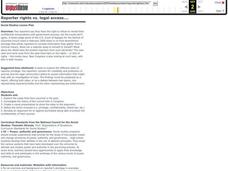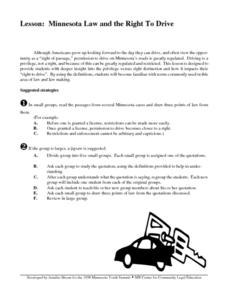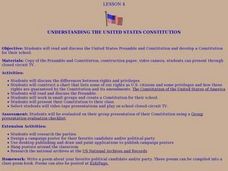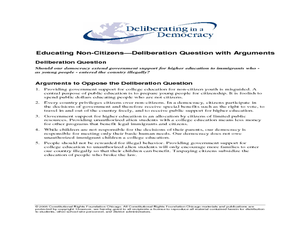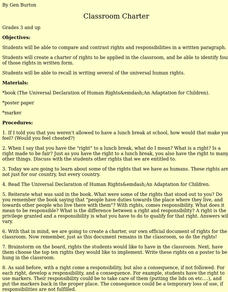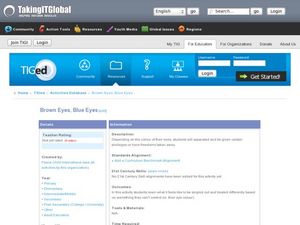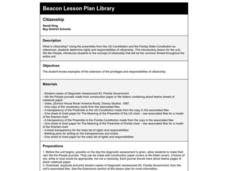Curated OER
American Revolution Simulation: Colonial History, Drama
Young scholars explain why the American colonies declared the independence, students should relate to that which is held most dearly i.e. life, liberty and the pursuit of happiness. They participate in a drama that illustrates this.
Curated OER
A Time for Justice
Young scholars engage in a lesson that focuses on the development of The Bill Of Rights in the United States. They conduct research using a variety of resources. Students two focus questions in order to guide the information search. They...
Curated OER
The Reconstruction Period
Pupils use documents and other resources to evaluate the success or failure of the Reconstruction for giving rights to African Americans. The documents are primary resources with questions included for students to complete.
Curated OER
Culminating Writing Assessment: History
Students reflect on power, privilege, and standing in American society. In this writing skills instructional activity, students respond to the question, "If you are denied power, privilege, and equal standings with other Americans, how...
Curated OER
My Story, Our Stories (Rights and Freedoms)
Students research the Canadian rights and freedoms and express one of their freedoms by sharing a story about their family
Curated OER
Reporter Rights vs. Legal Access...
High schoolers explore cases that have occurred in the past in which reporters refuse to reveal their confidential conversations with government sources and investigate the status of the current bills in Congress. Students use this...
Curated OER
Minnesota Law and the Right to Drive
Students, in groups, investigate different cases and draw points of law from them. They also examine quotations and draw points of law from them as well.
Curated OER
Understanding the United States Constitution
Students discuss the United States Preamble and Constitution. In this United States government lesson, students discuss the differences between rights and privileges and construct a chart that lists some of our rights as citizens....
Curated OER
Miranda v. Arizona (1966)
Students examine Miranda v. Arizona. In this court decisions lesson, students analyze the self incrimination case and read other supplemental articles about police procedures and due process. Students discuss the Supreme Court decision...
Curated OER
The French Revolution
Plenty of events and attitudes incited the French Revolution. Your class will learn all about the causes, effects, and changes that took place during and after this war. Each slide is put together in an easy-to-follow fashion, with...
Deliberating in a Democracy
Educating Non-Citizens
Students distinguish between the privileges of being a U.S. Citizen and privileges that are forfeited if not a U.S. Citizen. For this history lesson, students analyze the rights of people in a democratic society through research,...
Curated OER
What is Meant by Returning to Fundamental Principles?
What did the Founding Fathers mean by the importance of continually returning to fundamental principles? Your young historians will analyze a series of quotations illustrating the fundamental ideals and principles of the...
Curated OER
My Secret War: Lesson 5
Fifth graders determine how freedom comes with rights and responsibilities through literature and poetry about World War II. In this World War II lesson, 5th graders use the letters in the word "infamy" to write an acrostic poem. They...
Curated OER
A Time for Justice
Students explain the protections and privileges of individuals and groups in the United States.
Curated OER
Classroom Charter
Young scholars compare and contrast rights and responsibilities in a written paragraph. They create a charter of rights to be applied in the classroom, and identify four of those rights in written form.
Curated OER
The ABCs of Citizenship
In this lesson, learners read the book that focuses on the ascpects of citizenship/ Students imagine a scene in which each statement is actually happening. Learners descirbe rights, repsonisbilities. Assess students by asking what is...
Center for Civic Education
What Is Authority?
Young scholars examine the concepts of power and authority as they begin learning about government in this elementary social studies lesson. Through a series of readings, discussions, and problem solving activities, children...
Curated OER
A Child: Past And Present, Rich And Poor
Ninth graders analyze universal human rights. They examine their causes, consequences, and possible solutions, and discuss selected global issues. They plan and evaluate age appropriate actions to support peace and sustainability in our...
Curated OER
Us and Them
Students identify/analyze a variety of strategies to explain, create artworks and write about persistent issues involving the rights, responsibilities, roles and statue of individual citizens from a global perspective. A variety of...
Lakeshore Learning
Star of the Week
Encourage good behavior and effort in your class and promote positive reinforcement among classmates by picking a "Star of the Week" throughout the school year. This set of printables will help to get you started!
Curated OER
Democracy
Eleventh graders examine the denial of rights to individuals in the United States. In this American Government instructional activity, 11th graders study President Roosevelt's Day of Infamy speech. Students create a...
Curated OER
Brown Eyes, Blue Eyes
Students are given certain privileges or have freedoms taken away based on their eye color to demonstrate what it feels like to be singled out by uncontrollable factors. For this singled out lesson plan, students discuss how it feels to...
Curated OER
Willing to Participate: Political Engagement of Young Adults
Students consider what it means to be politically involved. In this civics lesson, students discuss voting as a privilege or right. Students also discuss how they may be able to effect social change through political involvement.
Curated OER
Citizenship
Fifth graders read the preamble of the U.S. and Florida Constitutions. They discuss vocabulary definitions surrounding the concept of citizenship. They discuss and write about the rights and responsibilities of citizens and apply their...
